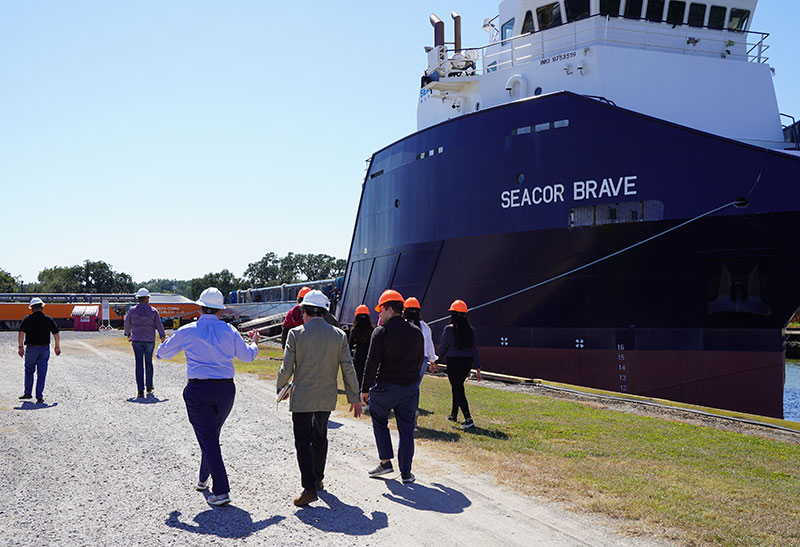
Peter Ricchiuti, center, and a team of Burkenroad Reports student analysts visit SEACOR Marine in Houma, Louisiana, in October 2022.
When I was at the University of Connecticut in the early 2000s, I became the faculty director of edgelab, a collaboration between UConn and General Electric that brought students, faculty members and GE managers together to work on projects for the company. This was in the early days of the Internet, e-commerce and data analytics, and many of the projects involved analyzing large data sets that GE — a Six Sigma company — had collected and making strategic recommendations.
I’m not exaggerating when I say that this experience transformed my view of business education. GE got additional bandwidth to work on strategically important projects, our faculty built closer ties with industry, enriching their teaching and research, and our students got experience working on cutting-edge projects for a major corporation, acquiring the kind of knowledge that comes only from doing. It was win-win-win.
It became crystal clear to me that experiential learning — in which students put their classroom knowledge to the test by working on real business challenges — represented the future of business education, and the outstanding placement rate of our graduates who worked in edgelab was all the additional proof I needed.
When I was first contacted about joining Tulane, one of the things that most attracted me was the Freeman School’s long and successful history of experiential learning. From Burkenroad Reports to the Darwin Fenner Student Managed Fund to the Selber Courses in Alternative Investments, Freeman has been developing expertise in delivering high-value experiential learning for almost 30 years, earning national recognition in the process.
But experiential learning is more than just a highly effective pedagogical method. It is also the perfect educational model for this moment in time. Rapid change is all around us. Artificial intelligence and smart automation are transforming the business landscape. The quest for sustainability is leading to
seismic shifts in energy and transportation. International conflicts and trade wars are disrupting supply chains, prompting the need for more robust risk management. And the growing call for social justice is being met by new initiatives aimed at creating fairer, more equitable work environments.
In times of rapid and dramatic change, when work expectations are evolving quickly, we need to shorten learning cycles and train students to adapt and learn on the job. This is precisely what experiential learning prepares students to do. I learned that in the early days of the dot-com era and through the GE edgelab program.
When we began drafting a new strategic plan for the Freeman School, our objective was to provide students with the knowledge, skills and experience to lead in a fast-changing world. Given the highly dynamic environment we find ourselves in, it was clear that experiential learning would be key, and as an exemplar of experiential learning, we have a significant advantage over many of our peers. A central theme of our strategic plan is to more fully integrate experiential learning throughout our programs. As you can imagine, identifying projects to accommodate nearly 3,000 students and then providing the necessary oversight to ensure that those projects are completed to the satisfaction of their professors and the businesses is a significant logistical challenge.
To address this need, I am proud to announce that we will be launching a new Center for Experiential Learning to oversee this transformative initiative. We will also be hiring a new director of experiential learning to lead the center and additional staff members to support students in their experiential learning activities. We will also be hiring a new assistant dean of corporate relations to lead our corporate engagement strategy, connecting students and faculty with local, national and international businesses for the benefit of both Freeman and those organizations. Among the businesses we’ll be targeting are those led by Freeman alumni. Our alumni are our greatest resource, and we are committed to leveraging this important asset to enhance our programs and build an even stronger business school.
Experiential learning runs through our strategic plan, but it’s only one element. There are exciting new initiatives related to our full-time MBA program, online education, research and knowledge creation, innovation and entrepreneurship, institutional excellence and many other areas. I’m extraordinarily proud of the work our faculty, staff, students, alumni and other stakeholders did in creating this plan, and I’m even more excited about what it will mean for us as an institution over the next five years. In the coming months, I look forward to sharing more details with you as we roll out new initiatives and work to build an even greater A. B. Freeman School of Business.

